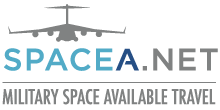I'm selected for a flight and the PSA wants to know my "Final Destination." What is this and what do I do? Think of the "Final Destination" as the furthest place you want to travel away from the place you are first selected for a flight.
For example, let's say you've been signed up at Dover for a long time (55 days for a retired Space-A traveler) and Dover is the only place you have signed up (if you were smart you would have also signed up at all nearby departure points such as Andrews, BWI, McGuire etc.. as well). But, let's say you weren't smart and you just signed up at Dover. You desire transportation to Aviano, Italy so Aviano is going to be your "final destination." The only flights leaving Dover are going to Ramstein AB, Germany. You're selected for the Ramstein flight and during check-in the PSA will ask you for your "final destination." You smile and say "Aviano, Italy please!" If all goes well, the PSA won't even blink and he/she will present you with an AMC Form 148 (aka a Boarding Pass) with "Aviano" listed as your destination (even though the mission you have been selected for is only going as far as Ramstein. Do not leave the Space-A counter unless Aviano is listed on your boarding pass as the destination! If necessary, refer the nice PSA to the Space-A regulations (DoDI 4515.13 Section 4.7.C or Air Mobility Command Instruction 24-101 Vol 14, Para 12.63 that states: "The original date and time of sign-up will be documented and remain with the traveler until movement to their declared final destination is complete, their leave terminates, or a maximum of 60 days has passed, whichever occurs first." Ensure the passenger's final destination is annotated on the boarding pass.
If you don't follow the above process then you will arrive at Ramstein and you will have to re-signup for space-a travel from Ramstein to Aviano (in other words your 55-day seniority as a Cat-VI will now be a zero-day seniority!). If you follow the above process then, upon presentation of your boarding pass at Ramstein's Pax desk the PSA "should" register you in their system with the same 55-day signup seniority (probably 56 days now!). Again, if they don't, refer them to the regulations.
This process works no matter how many different missions you take or how many locations you pass through (as long as you are "continuing to move to your declared final destination"). In other words, you can't take a week touring Germany (or other locations) enroute. This process has worked for me even going in opposite directions (e.g. "going east to go west"). Once, I had a hard time getting out of Mildenhall, UK to Dover so I took a flight to Germany with "Dover" listed as my "final destination" and then was selected for a flight from Ramstein to Dover based on my Mildenhall date/time group signup (I wasn't signed up at Ramstein). Here's an example of what your boarding pass should look like. In this example, you'll see Dover was mistakenly entered when I departed Mildenhall and I had to have the PAX rep annotate it with the correct "final destination" of Travis so I would retain my signup priority when the mission terminated at Dover. To be safe, ensure the computer system prints your final destination on your boarding pass as written entries may not be accepted everywhere. If you get a Pax Rep who says the system can't print your Final Destination on the boarding pass or it's not allowed then ask for a senior Pax Rep as the system and regs allow it. Knowledge is power.


